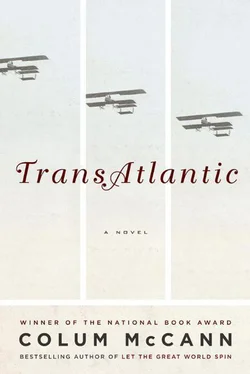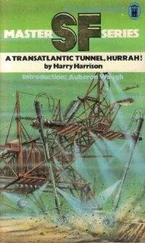Brown touches his nose, his chin, his teeth, to see if he is intact. A few cuts, a few bruises. Nothing else. We’re alive. We’re perpendicular, but we’re alive.
The Vimy sticks out of the earth like some new-world dolmen. The nose is buried at least two feet in the bog. The tail in the air.
— Crikey, says Alcock.
He can smell petrol somewhere. He switches off the magnetos.
— Quick. Out. Down.
Brown reaches for the logbook, the flares, the linen bag of letters. Pulls himself up over the edge of the cockpit. Throws down his walking stick and it hits like an arrow in the bog below, stuck sideways in the soil. A burn in the leg as he lands. Hallelujah for the ground: it almost surprises him that it isn’t made of air. A living dolmen, yes.
In the pocket of his flight suit, Brown has a small pair of binoculars. The right lens has fogged, but through the good lens he sees figures high-stepping across the bog. Soldiers. Yes, soldiers. They seem for all the world like toy things coming, dark against the complicated Irish sky. As they get closer he can make out the shape of their hats and the slide of rifles across their chests and the bounce of bandolier belts. There’s a war going on, he knows. But there’s always some sort of war going on in Ireland, isn’t there? One never knows quite whom or what to trust. Don’t shoot, he thinks. After all this, don’t shoot us. Excuse me. Nein, nein . But these are his own. British, he is sure of it. One of them with a camera bobbing at his chest. Another still in his striped pajamas.
Behind them, in the distance, horses and carts. A single motorcar. A line of people coming from the town, snaking out along the road, small gray figures. And look at that. Look at that. A priest in white vestments. Coming closer now. Men, women, children. Running. In their Sunday best.
Ah, mass. So, they must have been at mass. That is why there was nobody on the streets.
The smell of the earth, so astoundingly fresh: it strikes Brown like a thing he might eat. His ears throb. His body feels as if it is still moving through the air. He is, he thinks, the first man ever to fly and stand at the exact same time. The war out of the machine. He holds the small bag of letters up in salute. On they come, soldiers, people, the light drizzle of gray.
Ireland.
A beautiful country. A bit savage on a man all the same.
Ireland.
DAWN UNLOCKED THE MORNING IN INCREMENTS OF GRAY. The rope tightened hard against the bollard. The water slapped against Kingstown Pier. He stepped off the gangplank. Twenty-seven years old. In a black greatcoat and a wide gray scarf. His hair worn high and parted.
The cobbles were wet. Horses breathed steam into the September mist. Douglass carried his own leather trunk to the waiting carriage: he was not yet used to being waited upon.
HE WAS BROUGHT to the home of his Irish publisher, Webb. A three-story house on Great Brunswick Street, one of the better streets in Dublin. He relinquished his trunk. He watched a footman struggle with the weight of it. The servants stood in a line and greeted him at the door.
He slept through the morning and afternoon. A maid ran a warm bath in a deep iron tub. It was filled with a powder that gave off a fragrance of citrus. He fell asleep again, woke panicked, could not tell where he was. He climbed quickly from the water. The print of his wet feet on the cold floor. The towel touched, coarse, at the back of his neck. He dried the sculpt of his body. He was broad-shouldered, muscled, over six feet tall.
He could hear church bells ringing in the distance. A turf smell in the air. Dublin. How odd it was to be here: damp, earthy, cold.
A gong sounded from downstairs. Dinnertime. He stood at the hand basin, before the looking glass, and shaved closely, shook the creases from his jacket, mounted his cravat tight.
At the bottom of the stairs, at the end of a corridor, he stood for a moment disoriented, unsure which door to go through. He pushed one open. The kitchen was steam-filled. A maid was loading plates onto a tray. So very pale. The proximity of her sent a shiver along his arms.
— This way, sir, she muttered, squeezing past him in the doorway.
She led him along the corridor, bowed as she opened the door. A fire leaped orange in the ornate mantelpiece. A whirr of voices. A dozen people had gathered to meet him: Quakers, Methodists, Presbyterians. Men in black frock coats. Women in long dresses, aloof and elegant, the mark of bonnet ribbons still on the soft of their necks. They applauded quietly when he walked into the room. His youth. His poise. They leaned in close as if to secure his immediate confidence. He told them of his long travel from Boston to Dublin, how he was forced into steerage on the steamer Cambria even though he had tried to book first class. Six white men had protested his presence on the saloon deck. Threats of blood were urged against him. Down with the nigger . They had come within a whisker of blows. The captain stepped in, threatened to throw the white men overboard. Douglass had been allowed to walk the deck, even delivered a speech to the passengers. Still, at night, he had to sleep in the underbelly of the boat.
The listeners nodded gravely, shook his hand a second time, said he was a fine example, a good Christian. He was guided into the dining room. The table was laid with fine cutlery and glassware. A vicar stood to give grace. The meal was exquisite — lamb with mint sauce — but he could hardly eat. He sipped from the water glass, found himself faint.
He was called upon to give a speech: his days as a slave, how he slept on a dirt floor in a hovel, crawled into a meal bag to stave off the cold, put his feet in the ashes for warmth. How he had lived with his grandmother for a while and had gone, then, to a plantation. Was taught, against the law, to read, write, and spell. How he read the New Testament to his fellow slaves. Worked in a shipyard with Irishmen as companions. Ran away three times. Failed twice. Escaped Maryland at twenty years of age. Became a man of letters. He was here now to convince the people of Britain and Ireland to help crush slavery through peaceful moral persuasion.
He was well-practiced — he had spent more than three years giving speeches in America — but these were respectable men of God and empire, in a new land altogether. The obligation of distance. The necessity to say precisely what he meant. To clarify without condescending.
The nerves unbuttoned the length of his spine. His hands grew clammy. His heart hammered. He did not want to pander. Nor did he want to obscure. He was, he knew, not the first black man to land in Ireland to lecture. Remond had been here before him. Equiano, too. The Irish abolitionists were known for their fervor. They came from the land of O’Connell, after all. The Great Liberator. There was, he’d been told, a hunger for justice. They would open themselves to him.
The guests watched as if a carriage was galloping along, but might suddenly overturn in front of their eyes. A bead of sweat rolled down between his shoulder blades. He found himself faltering. He rounded his fist, coughed into it, dabbed at his brow with a handkerchief. He had made himself free, he said, but remained property. Merchandise. Chattel. A commodity in law. At any moment he could be returned to his master . The word itself was vicious. He wanted to smash it, ruin it. Massah . He could be whipped, his wife defiled, his children bartered. There were still churches in America that supported the system of ownership: an indelible stain on the Christian mind. Even in Massachusetts he was still chased down the street, beaten, spat upon.
He was there, he said, to raise just a single hat, but eventually that hat would raise the heavens. He would go forth as a slave no more.
Читать дальше












